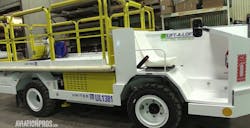Detroit Metro Airport's management says it's confident Northwest Airlines Inc. can weather a mechanics strike without major disruptions.
But it is prepared to handle a drop in passengers caused by a strike or a bankruptcy filing at Metro Airport's financially distressed hub carrier. Northwest -- which lost $683 million during the first half of the year -- has vowed to keep flying a full schedule during a strike by hiring replacement workers and outsourcing more work.
"They have laid out a very good case, from what I can tell, that they can continue operating," said Lester Robinson, CEO of Metro Airport.
But mechanics who stand to lose their jobs to replacement staff say that will be impossible. It is unlikely that operating with new mechanics will go smoothly, said airline consultant Darryl Jenkins.
Nearly anyone who flies into or out of Metro could face a disruption if the mechanics walk or get locked out. Northwest carries three out of five passengers who start or end their trips at the airport. The airline operates more than 590 flights a day out of the airport -- or about four out of every five flights that depart Metro. About 100,000 passengers fly in or out of Metro each day.
Metro is also preparing for a Northwest bankruptcy filing.
Airport officials last month extended a contract with Milwaukee-based law firm Foley & Lardner LLP to represent the airport in a potential Northwest filing. The firm represented Metro Airport in the United Airlines and US Airways bankruptcies.
Impact Hard to Predict
Ultimately, it's impossible to tell until Aug. 20 if the strike would prompt flight cancellations and drive passengers away. One reason for that: Northwest unions haven't said if they plan to honor the mechanics' picket line.
But any major disruptions to Northwest's operations would likely dip into Metro Airport's pocketbook.
Northwest contributes to the airport's budget by paying landing fees, rent and by passing a $4.50 passenger fee to departing travelers.
Landing fees and passenger fees are the two streams of revenue most at risk if traffic declines.
This year, Northwest contributed about $62 million or nearly 70% of the $91 million the airport collects in landing fees, which are based on the weight of the planes that an airline lands at the airport.
In all, Northwest will account for $86 million, or nearly 40%, of the airport's $225-million budget.
Those dollars are at risk if Northwest customers balk at the thought of crossing a picket line, flying on an aircraft handled by replacement mechanics or dealing with the hassle of potential flight cancellations.
If traffic and revenue decrease, the airport would first tap into $83 million in cash that would help it operate without major changes for several months.
"We're pretty well positioned to absorb a temporary business interruption," said Vernice Davis Anthony, chairwoman of the Wayne County Airport Authority, which oversees the airport.
At the same time, officials would start cutting costs, doing simple things such as increasing the thermostat to spend less money on air conditioning, said Airport spokesman Michael Conway.
But if Northwest experiences major delays and cancellations and sees a steep drop in passengers, airport officials may need to close a runway or even the Berry Terminal to cut costs, Conway said.
If Northwest leaves some of its 97 gates vacant during the strike, the airline can assign those gates to other airlines, Conway said. That would allow officials to close Berry to save on maintenance, utilities and security costs there.
One industry expert said the preparations are imperative at a time when financial pressures have forced US Airways out as the hub carrier at Pittsburgh International Airport and Delta Airlines out of its hub at Dallas/Ft. Worth International Airport.
"You want to make some small sacrifices now to avoid much larger sacrifices later," said Seth Young, associate professor at the College of Business at Embry-Riddle Aeronautical University.
Metro Airport has seen strikes before.
In 1998, Northwest's pilots went on strike, shutting down the airline for 18 days, which caused the airport to lose $2.8 million in revenue, Conway said
Free Press articles from the time reported that landing fees at the airport dropped $124,000 a day during the strike.
Copyright 2005 Associated Press




